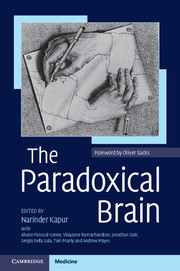Book contents
- Frontmatter
- Contents
- Acknowledgements
- Preface
- Foreword
- Author affiliations
- Abbreviations
- 1 The paradoxical nature of nature
- 2 Paradoxical effects of sensory loss
- 3 Paradoxical functional facilitation and recovery in neurological and psychiatric conditions
- 4 Paradoxes in neurorehabilitation
- 5 The paradoxical self
- 6 Paradoxical psychological functioning in early child development
- 7 Cognitive ageing: a positive perspective
- 8 Paradoxes of learning and memory
- 9 The paradox of human expertise: why experts get it wrong
- 10 Paradoxes in Parkinson's disease and other movement disorders
- 11 Paradoxical phenomena in epilepsy
- 12 Paradoxical creativity and adjustment in neurological conditions
- 13 Paradoxical functional facilitation with noninvasive brain stimulation
- 14 Unexpected benefits of allergies and cigarette smoking: two examples of paradox in neuroepidemiology
- 15 The paradox of autism: why does disability sometimes give rise to talent?
- 16 Paradoxes in creativity and psychiatric conditions
- 17 The paradox of psychosurgery to treat mental disorders
- 18 The paradox of electroconvulsive therapy
- 19 Paradoxes of comparative cognition
- 20 Paradoxical phenomena in brain plasticity
- 21 Immature neurons in the adult brain. Breaking all the rules
- 22 The paradoxical hippocampus: when forgetting helps learning
- 23 Paradoxical effects of drugs on cognitive function: the neuropsychopharmacology of the dopamine and other neurotransmitter systems
- 24 The paradoxical brain – so what?
- Index
- References
14 - Unexpected benefits of allergies and cigarette smoking: two examples of paradox in neuroepidemiology
Published online by Cambridge University Press: 05 December 2011
- Frontmatter
- Contents
- Acknowledgements
- Preface
- Foreword
- Author affiliations
- Abbreviations
- 1 The paradoxical nature of nature
- 2 Paradoxical effects of sensory loss
- 3 Paradoxical functional facilitation and recovery in neurological and psychiatric conditions
- 4 Paradoxes in neurorehabilitation
- 5 The paradoxical self
- 6 Paradoxical psychological functioning in early child development
- 7 Cognitive ageing: a positive perspective
- 8 Paradoxes of learning and memory
- 9 The paradox of human expertise: why experts get it wrong
- 10 Paradoxes in Parkinson's disease and other movement disorders
- 11 Paradoxical phenomena in epilepsy
- 12 Paradoxical creativity and adjustment in neurological conditions
- 13 Paradoxical functional facilitation with noninvasive brain stimulation
- 14 Unexpected benefits of allergies and cigarette smoking: two examples of paradox in neuroepidemiology
- 15 The paradox of autism: why does disability sometimes give rise to talent?
- 16 Paradoxes in creativity and psychiatric conditions
- 17 The paradox of psychosurgery to treat mental disorders
- 18 The paradox of electroconvulsive therapy
- 19 Paradoxes of comparative cognition
- 20 Paradoxical phenomena in brain plasticity
- 21 Immature neurons in the adult brain. Breaking all the rules
- 22 The paradoxical hippocampus: when forgetting helps learning
- 23 Paradoxical effects of drugs on cognitive function: the neuropsychopharmacology of the dopamine and other neurotransmitter systems
- 24 The paradoxical brain – so what?
- Index
- References
Summary
Summary
This chapter explores puzzling paradoxes that apply to two major neurological diseases. The first involves allergies which range in severity from allergic rhinitis, which may cause only mild discomfort, to allergic asthma which can be life-threatening. It has been repeatedly demonstrated that people with malignant brain tumours have fewer allergies than people who do not. The reasons for this association are unknown, but it is possible that allergies reflect an active immune system that is also able to destroy nascent tumours. Alternatively, it is well known that malignant brain tumours suppress antitumour immunity, so it is possible that they suppress allergies as well. The second paradox involves cigarette smoking, well known to cause lung cancer, heart disease, chronic respiratory disease and other harmful effects that have been extensively documented. Yet cigarette smokers have a lower risk of Parkinson's disease than do people who have never smoked cigarettes. Epidemiologic evidence indicates that this paradox is not an artefact, but that cigarette smokers actually enjoy lower risks of Parkinson's disease as a result of smoking. These reduced risks probably result from nicotine's observed protective effects on the nervous system.
Introduction
Conventional wisdom maintains that an illness or assault on one organ should not have a beneficial effect on another. Yet in neurology, as in other branches of medicine, there are cases where harm to one biological system appears to benefit another. This chapter focuses on the protective effects of allergy on glioma, and of smoking on Parkinson's disease.
- Type
- Chapter
- Information
- The Paradoxical Brain , pp. 261 - 273Publisher: Cambridge University PressPrint publication year: 2011
References
- 1
- Cited by

